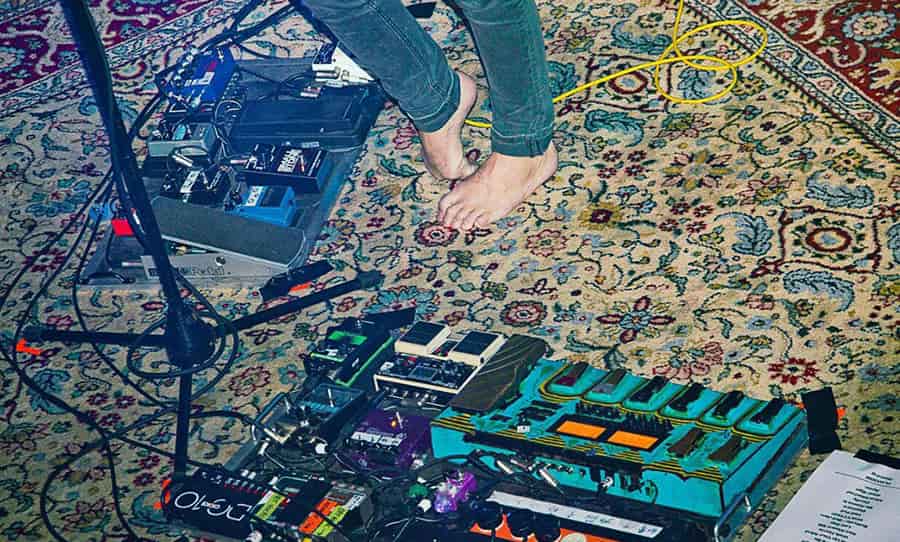Diving into the world of guitars, amps, and pedals can be overwhelming, with endless options and combinations out there to confuse even the most restrained budding musos. To help, here is a quick guide to getting the most out of your guitar, pedal and amp combo.
Guitars are popular – just about everyone wants to learn the guitar at one point in time and audiences in all global spheres are familiar with the sound. But with the proliferation of guitar in every genre, how do you stand out from the noise?
A unique sound can do wonders for a recording or performance, and even for the branding of your project. So how do you get the most out of your guitar sound and make that combination of guitar, pedals and amp shine? Here is some advice for those just starting out and searching for the right gear, and perhaps a few reminders for the more seasoned players with more pedals than they care to admit.

You Don’t Need the Most Expensive Gear
When you’re buying your first pieces of gear, you may not have infinite cash to buy that hand-wired AC30 or vintage Fender Jazzmaster you’ve been pining for. Not to fret, a good sound is not limited to how much cash you have in your pocket (I’ve gotten my favourite guitar tone with a 10 Watt practice amp with the overdrive cranked and a Squire Jazzmaster).
Good sounds don’t necessarily come from good gear, they come from a good ear, trial and error, and a whole lot of experimentation. Being limited can also stretch your creativity – the fewer gear options at your disposal, the harder you have to think to build an intriguing tone.
Overuse and Abuse of Pedals
Pedals, in their infinite glory, can colour your sound in every which way, if you have the knowhow. Variety is the spice of life, and having four different guitar sounds in a single song is certainly a broad palette. But with the use of pedals comes the risk of overuse. Do not forget the sound of your guitar. Do I want to hear a wah pedal with a Bitcrusher and heavy distortion through your whole set? Maybe, maybe not. In the soup of music, pedals are the pepper and salt, not the chicken.

Get to Know What You Have
While some guitarists may have a lot of pedals and use them very well, there is definitely merit in a light chain. Knowing all the parameters of a few pedals, or even one in some instances, can give you better value for money and help you to forge your own sound. You could compare it to having hundreds of paint tubes versus mixing your own colours with a select few. A handful of quality pieces paired with an informed notion of how to use them can make for refined sound that you are totally in control of.
Maintenance
You may not think this makes a big difference to your sound, but once you do it, you will notice the difference. Give your equipment a good clean, and give your guitar a good setup. Everything affects your sound, and when I say everything, I even mean the finger gunk all over your fretboard. From slightly-out intonation to the toll taken from a hectic show, many factors can influence your tuning and tone. I’m as guilty as anyone when it comes to leaving strings on too long, or letting loose tuning pegs compromise my tuning – but it pays to keep up to date with guitar maintenance.
Selecting Equipment With Genre in Mind
You can select your guitar, amp, and pedals with versatility in mind, or if you’re after a specific sound, think about genre. If you pair a Fender Vaporizer and a Jazzmaster with a suite of reverb pedals, you’ve got surf rock, or for the mid rangey attack of a metal sound, go with a pointy Ibanez, the Mesa Boogie Triple Rectifier Amp, and the heaviest distortion pedals you can find.
If you’re a session guitarist or a musician of many loves, being able to choose between single coil and humbucking pickups might cover you for most sessions. Yet, as always with rules of thumb, it can be equally astute to forgo them, and carve out your own niche. If you like an Epiphone Sheraton with a heap of overdrive for your indie rock sound, go for it. As said above, you get your most compelling sounds through experimentation.
Studio as Tonemaker
If your final aim is a recording, do not underestimate the transformative power of the studio. Ambience plugins in the form of reverb and delay will offer an alternative framework from your stompboxes for sculpting tone. As a guitarist, having tactics for pulling the best sound in a studio’s live room, or possessing the wherewithal to get a great tone from an amp simulator plugin quickly in a production session will help to make you a worthy asset in any project.
Getting a good sound takes work, and almost as important to what you play is how you play it. Consider how everything affects your sound, and play to that advantage for your best and most unique sounding guitar.


